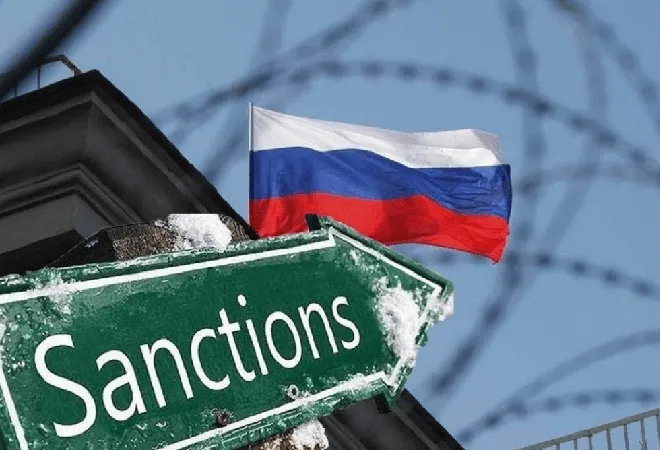-
CENTRES
Progammes & Centres
Location
The negative impact of the Russia-Ukraine war and attendant economic sanctions have been seen in different parts of the world, raising a new set of challenges.

This brief is a part of The Ukraine Crisis: Cause and Course of the Conflict.
The global headwinds in recent times—started by the new great power rivalry, exacerbated by the pandemic, and rapidly accentuated by the Russia-Ukraine war—have begun to take their toll in different parts of the world. Despite major economic, social, and environmental stresses, there is an increased level of domination of geopolitics over other challenges. Looking ahead, there are some major uncertainties, including those related to the duration of the ongoing Russia-Ukraine war, continuation of the economic sanctions’ regime, re-emergence of bloc politics, macroeconomic stability, and changing trade-patterns and supply chains.
The western strategies of support and aid to Ukraine for planning and conducting of military operations, strong posture by North Atlantic Treaty Organization on other frontier states, and comprehensive, multilateral economic sanctions against Russia have led to further hardening of position on both sides.
As the Russia-Ukraine war enters its sixth month, the prospects of an agreed ceasefire look slim, leave alone those of a negotiated settlement. Russia’s realignment of its objectives and change of strategy during the war, to focus almost solely on eastern and southern Ukraine and address some major flaws seen earlier, started a new phase in the war. It enabled Russia to make some notable gains in this second phase. In parallel, the western strategies of support and aid to Ukraine for planning and conducting of military operations, strong posture by North Atlantic Treaty Organization on other frontier states, and comprehensive, multilateral economic sanctions against Russia have led to further hardening of position on both sides. This combination of the war, military aid, and wide-ranging sanctions has produced a range of new challenges which have global implications and are not restricted to Eastern Europe. Among the new challenges, it is the economic sanctions whose global impact is more visible and discernible.
The concept of economic sanctions is age old, and its design and structure have undergone many changes over the centuries. There has long been a debate about the effectiveness of sanctions in achieving political outcomes, resulting in a division of opinions amongst experts. Nevertheless, its usage as a policy tool by the United States increased manifold since the end of the Cold War, driven primarily by the co-existence of unipolarity and globalisation. Deterrent as well as punitive sanctions have been used, unilaterally or in coordination with other partners. The United Nations too has increased the usage of sanctions significantly, under the provisions of Article 41 of the UN Charter.
Russia has taken steps to reduce the economic pain through a set of measures which include capital controls, preventing Russians from transferring hard currency abroad, banning exports for some commodities, raw materials, and equipment, forcing gas payments in Rubles, switching to alternate payment systems, and diversification of trade and investments.
In the context of the Russia-Ukraine conflict, a set of sanctions had been applied against Russia by the US and the European Union—and joined by a few other partners—during the period 2014 to 2021. The scope and the graduated application of these sanctions had enabled a high level of adaptation in the international system. More recently, the sanctions against Russia since February 2022 have been sharper, stronger, more extensive, and are intended to cripple the Russian economy for a long time to come. These include sanctions related to individuals and entities, banking and financial services, exports and imports, services and technologies, with a focus on sectors like energy (oil, gas, and coal, with protection and exemption measures particularly for the vulnerable EU countries), steel, mining, and agriculture. Russia has taken steps to reduce the economic pain through a set of measures which include capital controls, preventing Russians from transferring hard currency abroad, banning exports for some commodities, raw materials, and equipment, forcing gas payments in Rubles, switching to alternate payment systems, and diversification of trade and investments. It has also applied some countersanctions and reduced gas supplies to some European countries. The complex interplay of wide-ranging sanctions and countersanctions have resulted in adverse impact on global growth and has led to elevated inflation in commodities, food items, energy, and fertilisers. Supply chains have been disrupted in many sectors. The currency markets have been in a turmoil, national debt levels have been rising, and foreign exchange reserves have been dwindling for many economies. Governments as well as central banks have been forced to take tough fiscal and monetary actions. With the war and the sanctions continuing, the global economic outlook is currently bleak. Citing the example of the crisis in Sri Lanka, the International Monetary Fund (IMF) chief recently stated, “The global economic outlook has darkened significantly, and uncertainty is exceptionally high. Downside risks about which IMF had previously warned have now materialized.”
The sanctions by the US and the EU have been fully supported by the G7 and many western alliance and partner countries joined the sanctions regime against Russia. Several countries including China, Argentina, South Africa, Mexico, Indonesia, Turkey, and Serbia have issued public statements indicating that they do not believe that such sanctions can serve any purpose and they will not participate in them. Several others have adopted a neutral stance and not joined the sanctions, without any official statement about the same.
Steps to limit the economic fallout on the ‘sender’ countries and lack of coordination to limit the impact on developing countries have raised doubts about the response mechanisms.
The overall impact of economic sanctions against Russia is yet to unfold. But, three trends are discernible at this stage.
The negative impact of the Russia-Ukraine war and attendant economic sanctions have been seen in different parts of the world, raising a new set of challenges. The world opinion is divided over the conceptualisation and implementation of modern sanctions. The unintended consequences of the sanctions—particularly for the Global South and the developing world—have led to increased calls for a way ahead that enables a diplomatic solution and winding down of the sanctions. While several geopolitical uncertainties remain, the adverse fallout of economic sanctions and countersanctions indicates some trends that are likely to reshape the geo-economic landscape.
The views expressed above belong to the author(s). ORF research and analyses now available on Telegram! Click here to access our curated content — blogs, longforms and interviews.

Vice Admiral Girish Luthra is Distinguished Fellow at Observer Research Foundation, Mumbai. He is Former Commander-in-Chief of Western Naval Command, and Southern Naval Command, Indian ...
Read More +